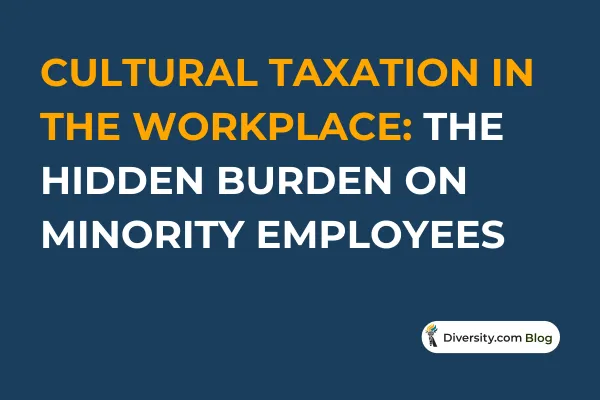
Cultural Taxation in the Workplace: The Hidden Burden on Minority Employees
In many organizations, employees from marginalized backgrounds often find themselves shouldering additional responsibilities related to diversity, equity, and inclusion (DEI) efforts.
These tasks, while crucial, frequently go unrecognized and uncompensated—a phenomenon known as cultural taxation. Understanding and addressing cultural taxation is essential for fostering truly inclusive workplaces.
What Is Cultural Taxation?
Coined by educational psychologist Dr. Amado Padilla in 1994, cultural taxation refers to the invisible labor expected from individuals of marginalized groups, such as serving on diversity committees, mentoring underrepresented colleagues, or educating others about cultural issues—without additional compensation or formal acknowledgment (Padilla, 1994).
These responsibilities are often assumed to be part of the employee’s identity, rather than work that warrants pay, support, or career credit.
Real-World Examples
Mentorship Load: A Black female executive is expected to mentor all new Black employees despite her demanding leadership role.
Diversity Representation: An LGBTQ+ employee is repeatedly asked to represent the company during Pride Month without workload adjustments.
Cultural Interpreting: A bilingual Latinx employee is asked to mediate team dynamics involving cultural misunderstandings—outside of their actual job function.
How Cultural Taxation Hurts Employees
Burnout: Constant emotional labor and pressure to “represent” a group can be exhausting.
Career Delay: Time spent on extra, unpaid DEI efforts may slow promotion or recognition in one’s actual field.
Tokenism: Employees often feel reduced to their identity, rather than valued for their full professional contributions.
What Employers Can Do
To build more equitable workplaces, leaders must take intentional steps:
Acknowledge the Labor: DEI work is real work. Recognize it in performance reviews and leadership pipelines.
Distribute DEI Responsibility: Don’t place the burden solely on marginalized staff—make inclusion a company-wide priority.
Support Work-Life Balance: Allow for flexibility and compensation when employees go above and beyond to support inclusion.
Elevate, Don’t Exploit: Ensure that DEI work enhances, rather than hinders, an employee’s career path.
How Diversity.com Supports Inclusive Hiring
At Diversity.com, we know that representation without recognition is not enough
As a DEI-focused job board, we help match inclusive organizations with professionals who value authenticity and equity. We help build organizations where inclusion isn’t just a value—it’s a practice.
For Employers & HR Leaders:
✔ Post Inclusive Job Listings — Reach a diverse pool of candidates by highlighting your organization's commitment to DEI.
✔ Access DEI Resources — Utilize our curated content to inform and enhance your DEI strategies.
✔ Engage with a Community — Connect with like-minded professionals dedicated to advancing workplace diversity.
For Job Seekers:
✔ Find inclusive employers — Discover organizations that prioritize equity and inclusion in their hiring practices.
✔ Enhance Your Profile — Showcase your experiences and skills to employers committed to DEI.
✔ Stay Informed — Access articles and resources to support your career development in inclusive workplaces.
We believe in a future where every career journey and every hire moves us closer to true equity.
Start building with Diversity.com.
If you have any questions or need assistance, feel free to Contact Us Here. Our dedicated support team is ready to help!
Related Articles
Tokenism at Work: How to Spot It and Replace It With Real Inclusion
Code-Switching in the Workplace: Navigating Identity and Professionalism
Burnout, Identity, and Inclusion: Why Mental Health Strategies Must Address More Than Workload
Stockholm Said No: What a Swedish Rejection of U.S. Pressure Says About Global DEI Values
Naval Academy Removes 381 DEI-Related Books Amid Federal Directive: Implications for Inclusive Hiring
Sources & References
Padilla, A. M. (1994). Ethnic minority scholars, research, and mentoring: Current and future issues. Educational Researcher, 23(4), 24–27.
Oxford Review. (n.d.). Cultural taxation – Definition and explanation. https://oxford-review.com/the-oxford-review-dei-diversity-equity-and-inclusion-dictionary/cultural-taxation-definition-and-explanation/
Smith Business Insight. (n.d.). Minority workers pay a hidden cultural tax. https://smith.queensu.ca/insight/content/Minority-Workers-Pay-a-Hidden-Cultural-Tax.php
The WIE Suite. (n.d.). Cultural taxation: The hidden burden holding back Black female leaders. https://www.thewiesuite.com/post/cultural-taxation-the-hidden-burden-holding-back-black-female-leaders
HERC Jobs. (n.d.). Managing 'cultural taxation' and combating burnout. https://www.hercjobs.org/managing-cultural-taxation-and-combating-burnout-tips-for-underrepresented-faculty-and-staff/

